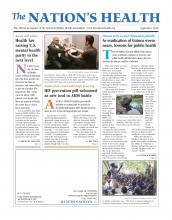Teen dating violence is a significant public health problem, but few high school counselors are placing a high enough priority on it, a new study finds.
Up to 34 percent of teens are affected by dating violence each year in the United States, according to the study, but little is known about schools’ practices and perceptions related to dating violence, even though schools can play a significant role in preventing it.
Published in August in Pediatrics, the study examined data from hundreds of high school counselors who were members of the American School Counselors Association. More than 81 percent of respondents said they did not have a protocol in place at their schools to respond to incidents of teen dating violence. In addition, 90 percent of the counselors surveyed said that in the past two years, training to assist survivors of teen dating abuse had not been provided to personnel in their schools. Fully 83 percent of respondents said their schools did not conduct periodic student surveys that included questions on teen dating abuse behaviors. Moreover, 76 percent of counselors said their schools did not have a committee that met periodically to address health and safety issues that included teen dating abuse.
However, the majority of school counselors — 61 percent — said they had assisted a victim of teen dating violence in the previous two years, with more than half, or 59 percent, noting that the victim was female.
More than 40 percent of high school counselors cited a lack of sufficient training as the main barrier preventing them from assisting teen dating violence victims. Another barrier to helping students, cited by about 28 percent of respondents, was a belief that teen dating violence is a minor issue when compared to all the other health issues that confront them.
To help high school students cope with dating violence and improve schools’ prevention efforts, the study recommended that schools periodically assess the entire study body to determine the extent of dating violence and its epidemiologic characteristics.
“Coordinated efforts would help reach the maximum number of high school students as opposed to disjointed efforts by individual school personnel,” the study authors wrote.
According to the study, between 30 percent and 60 percent of high school students tell no one about being victimized by their dating partners, and when they do tell someone they usually turn to their peers rather than parents, teachers or school counselors. The study recommended that school counselors become more proactive regarding anticipating the level of guidance needed to help prevent teen dating violence and to encourage reporting of teen dating violence incidents to trusted school authorities and health care providers.
“School counselors and pediatricians need to reach out to one another to form partnerships between counselors and providers to help augment their training on anticipatory guidance strategies and skill building in dealing with adolescent dating violence,” the study authors wrote.
For more information or to obtain a copy of the study, visit http://pediatrics.aappublications.org/content/early/2012/07/03/peds.2011-3130.abstract.
- Copyright The Nation’s Health, American Public Health Association









